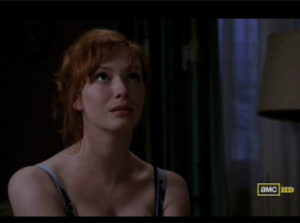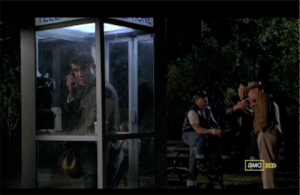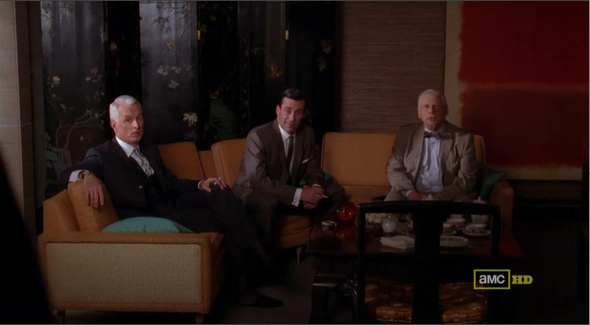As stated before, Mad Men tackles such a complex range of themes, events and thoughts that it demands overthinking. There is no superficial level on which to engage it. Many of the show’s motifs – the difference between appearance and reality, the subtle games of power, the war between young and old – have been discussed to death in better media than ours.
But there are two overarching themes for Season 3 that we can uncover.
The Answer, My Friend, Is Blowing In the Wind
Every character in Mad Men looks elsewhere for the force that will give their life meaning.
Some do this because they have little other choice. Salvatore Romano, the closeted gay art director for Sterling Cooper, buries himself in his work and his marriage to bottle up the feelings he succumbed to on a business trip in Ep1. But when trapped in an awkward situation by a sexually aggressive client, Don fires Sal, with some regret but little hesitation.
Peggy and Joan, the strongest females on the show, continue to pull in opposite directions. Peggy climbs the corporate ladder at Sterling Cooper with unprecedented speed. But her ambition makes other writers like Kinsey jealous of her and makes Don frustrated. Joan gets everything she always wanted: a marriage to a handsome, successful doctor. Only the doctor’s not quite as successful, or stable, as she imagined him to be. Both characters end Season 3 on an optimistic note, but only because they have a new crisis into which they can throw themselves. Outside of work, what do they have?

And the power couple of the show – Don and Betty – live meaningless lives because they lacked meaningful childhoods. We only get glimpses of Betty’s childhood in Season 3, hinted at in her strained relationship with her father. Betty has made up for it so far by living a child-like adulthood: drifting from one male to another in search of the one to save her. Don certainly had a childhood packed with meaning; he flashes back to it several times in the beginning of Season 3. But he’s done everything he can to bury that childhood, and his past before the war, behind him. Neither Don nor Betty have a firm foundation on which to build their adulthoods. This is unfortunate, because they picked a hell of a year in which to grow up.
Toward the end of Season 3, we start to see some anchorless characters gain a stronger resolve. Peggy enters an odd but satisfying affair with “Duck” Phillips, getting the sexual liberation she’s craved since Season 1. Pete Campbell, previously a vacuous blue-blood, becomes embittered in the wake of the Kennedy assassination. Betty, after some hesitation, reaches out to Henry to start a new life – the same sort of romantic liaison her husband has engaged in for years. And of course, there’s the pressure of starting a new business to keep everyone busy.
But not everyone ends up so lucky.

Mad Men is a story about men and women searching for meaning. Mad Men can tell this story because it’s set in an ad agency. Consumer capitalism, which really came into its own following World War II, sells products that add meaning to people’s lives. If Americans don’t believe that their choice of cigarette will make them happy, or that a slide projector can restore the innocence of youth, then Don Draper and his crew are out of a job.
The language of advertising transforms products from the utilitarian to the spiritual. You don’t stay in a Hilton Hotel because of price or convenience. You stay in a Hilton Hotel because it brings the comforts of home to a foreign setting. Pepsi can reinvigorate our tired routine; AquaNet can capture the man who’ll provide for us; London Fog can take us on stimulating romantic adventures.
Most of the characters in Mad Men started 1963 with a brand in lieu of a soul. Roger Sterling was the silver fox with a trophy wife; Hilton was the golden treasure that every ad agency sought to claim; Don Draper, the genius with his finger on the pulse of culture. But we discovered that the brand and the product behind it don’t always relate. Roger is more of a lost boy than a dignified man; consider his Kentucky Derby party, or his growing feuds with his new wife. Conrad Hilton turns out to be a cranky, implacable eccentric. And Don? Behind the mask, what is Don Draper?
The Kennedy assassination, the climax of Season 3, exposes branding as the poor prop it is. So many smart young Democrats in their 20s and 30s identified with Kennedy. The youngest President, the first President to capitalize on the new medium of television, and the first definitively “post-war” President in 30 years, Kennedy blessed his fans with youthful optimism. When he died violently, the entire cast of characters took a punch to the gut. It’s in light of this tragedy that Pete grows a spine, Betty declares to Don that she no longer loves him, and Don stages a walkout at Sterling Cooper. When your crutch gets knocked away from you, you stay down or you pull yourself back up.
The men and women of Mad Men search for a force to give their lives meaning. Whether they find it or not tells you how their story will turn out.

Thank you!
I thought Dr. Greg was going to die in Vietnam, and that was how we (the audience) were going to get Joan back. Possibly also Roger would get Joan back? But now he doesn’t have to die; now he’s more useful as a window into the escalation in Vietnam.
Also, Trudy is going to be more important, I suspect.
And the blogosphere has been paying very little attention to the politics of Betty/Henry– I think that’s going to get important next season, assuming, of course, that ends up the way everyone expects it to.
I further predict that we will sort of lose a lot of the people in the office at the old SC; and hope that Don (or someone) has the good sense to hire back Sal for their art direction, which they still do not have.
Another loose end to be tied up– Duck. What place does he have? Does Peggy drop him now that she has the attention and (well deserved) admiration of Don again? Curiouser and curiouser!
@perich and katie: I assume SCDP will end up working on the Rockefeller campaign, since Henry Francis is both Nelson’s right-hand man and close to Roger. That’s how Don and Betty will end up back in the same orbit in S4 — Don has to swallow his pride and work on the account, the client basically being the man who stole his wife… now THAT is some good conflict! (Plus, since Rockefeller was virtually destroyed by Goldwater in the GOP primaries… I’m sure many both outside the agency and in will blame Don, saying he wasn’t able to put his personal issues aside to help craft a winning campaign.)
I also wouldn’t call Duck a loose end to be tied up — I imagine he’ll hire Cosgrove and Kinsey (at the least) to compete with SCDP.
Also looking forward to having Sal back, as I’m sure is inevitable in the first episode or two!
@Kevin –
That’s some sharp thinking! Don getting stuck working for the man who stole his wife seems totally plausible. And I’m intrigued by the idea of Duck hiring Cosgrove and Kinsey. You’re implying there that Sterling Cooper (the old one) basically ceases to exist, and everyone who was left behind scatters to the four winds. I hadn’t thought about it, but it makes sense. ALL the agency’s partners just quit, and took a huge chunk of their business with them. It seems likely that whatever company is stuck owning that place is just going to cut their losses and walk away.
And actually, that puts the entire episode in a new light. When Draper, Sterling, and Cooper approach these underlings and offer them the chance to get in on this new agency, they weren’t asking them to take a risk, really. They were letting them know that Sterling Cooper was already dead and they were as good as laid off, and then offering them a new job. The REAL risk for these people would be turning Don down, and sticking with an agency that all the name partners are actively trying to destroy.
Hey Kevin, if it turns out that you’re right, and Francis DOES go to SCDP, come back to this comment thread to take a victory lap, okay?
@Matthew — Thanks for the kind words! What makes me doubt the Francis theory is that, well… Francis KNOWS Draper works there — hell, he’s now the ‘D’ in SCDP, after all — so you have to think it would be, uh… just ever-so slightly AWKWARD for him to show up, hat in hand, wanting to hire Betty’s ex to promote the campaign. Pretty weird.
I’m thinking they have to have a way around this — maybe it’s Rockefeller himself who wants to use SCDP and Francis has no say. But they HAVE to find a way for Don and Betty’s paths to cross. This seems like the most logical way to me…
@Kevin: there’s at least the opportunity for Henry and Roger to have a heart-to-heart over Old Fashioneds at some very reputable club.
“Hank. Buddy. Look, I understand your concern. But if anyone can keep Don Draper under control, it’s me. All right? Now let’s get some cheesecake.”
@Kevin- Maybe they go the other direction with this, and SCDP will be hired by the Goldwater campaign to take down Rockefeller. It would have the effect of bringing Don and Henry/Betty into a collision course without requiring quite as many contortions.
@Perich- That was some amazing fake Sterling dialogue- I can totally hear it coming right out of John Slattery’s mouth.
I just realized something interesting. The election of 1964 featured one of the most important TV ads of all time. Let me quote from Wikipedia:
“A Democratic campaign advertisement known as Daisy showed a young girl counting daisy petals, from one to ten. Immediately following this scene, a voiceover counted down: ten, nine, eight,…three, two, one. The child’s face was shown as a still photograph followed by images of nuclear explosions and mushroom clouds. The campaign advertisement ended with a plea to vote for Johnson, implying that Goldwater (whose name was not mentioned) would provoke a nuclear war if elected. The advertisement, which featured only a few spoken words of narrative and relied on imagery for its emotional impact, was one of the most provocative moments in American political campaign history, and many analysts credit it as being the birth of the modern style of “negative political ads” on television. The ad only aired once, and was immediately pulled, but then was shown numerous times by television stations.”
I’m not saying Don writes it. I’m just saying the timing is right. And since he clearly was a Kennedy supporter, there’s nothing far-fetched about him working for the democratic administration. Actually, it might be really cool to have Don visit the White House to discuss strategy (not with the President himself, but with some important-looking bigwigs in nice suits).
@Matthew and Sheely: I think you’re *both* on to something: Barry Goldwater will become SCDP’s client, not Rockefeller; and toward the end of the season, it will be the Johnson campaign’s “Daisy” ad that will utterly destroy the work of SCDP for Goldwater.
That’s because the firm that created the “Daisy” ad was real-world DDB — the same firm that came up with the famous “Think Small” Volkswagen ads… the same campaign that Don and his colleagues ridiculed back in S1. A campaign that was voted many years later as the *best* advertising campaign ever made. It would be so ironic — and so MAD MEN — for the competition to once again be ahead of the curve and show SC (now SCDP) how much they still have to adapt to the changing times.
Of course, the one thing that would be hard getting past is the fact that Goldwater was so hugely unsympathetic… still, wouldn’t it be great to see the boys win the battle (against Rockefeller, and by extension Francis & Betty), but lose the war once again to DDB?
@katie, kevin: the first thing i hoped for when Don was searching for employees to come with him to SCDP was the return of sal. he was always one of my favourite characters.
unfortunately, the reason sal had to leave was because of Lucky Strike. Lucky Strike was a large enough client to Sterling Cooper that without them, they would go out of business. Now with fewer clients, Lucky Strike is the core of SCDP’s business. Unless the writers decide to ignore this, I can’t see Sal coming back.
@Kevin: I can see SCDP going with Goldwater. S1 established Bert Cooper as more conservative than the rest of the company (he’s a personal friend of Ayn Rand); I wouldn’t be surprised if he knows someone who knows the Senator.
Also note: the 1964 RNC is also the first time a middle-aged actor named Ronald Reagan takes the political spotlight, making a famous speech that puts him on the path toward the governorship of California in ’66.
Henry is a very strange character. Too perfect but not…Rockefeller married a divorced woman and won the govenorship. What if Henry does the same but becomes Vice president. Or even president..a nixionian president. I think Henry has a secret agenda. One that he may not be aware of yet. Coveting the wife of the most masculine man on the planet may be his bid for masculinity. Whatever, Betty’s social standing and inheritance will grease his political wheels. Betty will probably become an alcoholic. A Joan Kennedy or Betty ford. I don’t think we’ve seen all of Don’s secrets yet. Don is Superman. The observations about the Daisy commercial are terrific. But I don’t think our team will be behind it. That team needs to stay intact . Bigger fish to fry. Perhaps apple’s ground breaking commercial. When the turbulance of the 70’s continues we will see feminism peak and personify itself in one of our characters. We’ll see civil rights. In full bloom. Assassinations, war, protests , free sex and drugs… Watergate… The list is obvious. The way our characters willchange during changing times is not so obvious,